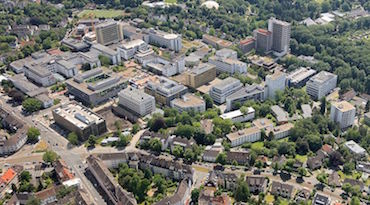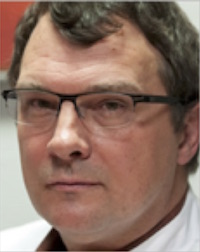

Essen University Medical Center, University of Duisburg-Essen
  |
|
The Vascular Oncology & Metastasis Group headed by PD Dr. rer. nat. Iris Helfrich (https://hautklinik.uk-essen.de/studien-forschung/ag-vaskulaere-onkologie-metastasierung-helfrich/) is interested in understanding the multifactorial steps of melanoma metastasis and the reciprocal communication of tumor cells with cells of the microenvironment with regard to cancer therapy. Heterogeneity of the mutational landscape of tumors indicates that tumor diseases are much more complex than histology-based classification suggests. For this, we will use our pipelines, which have been developed in the context of the International Cancer Genome Consortium, The Cancer Genome Atlas project and platforms providing tumor transcriptome, genomics and clinical data to analyse and statistically validate tumorigenic significance of the implicated DNA helicases in multiple cancer entities.
Role in the AntiHelix project
State-of-the-art 2D/3D in vitro assays to monitor DNA helicase-dependent cell function and activation of signaling pathways in real time will be carried out by ESR9. In addition, various experimental tumor models (xenotransplantation / genetically controlled spontaneous melanoma models) and intra-vital imaging / high-resolution microscopy will be employed to identify DNA helicase-mediated tumor modulating mechanisms under dynamic environmental conditions.
The AntiHelix Team
| Iris Helfrich | ESR9 Supervisor | Iris.helfrich@uk-essen.de |
|---|---|---|
| Dirk Schadendorf | ESR9 Supervisor | Dirk.Schadendorf@uk-essen.de |
| Sebastian George | Administrator | Sebastian.George@uk-essen.de |
| Sara Egea | ESR9 | Sara.EgeaRodriguez@uk-essen.de |
|
Iris Helfrich  |
|
Iris Helfrich is the supervisor of ESR9; Leader of Work Package 5 (Therapeutic validation and clinical translation); Co-organiser of the Final Plenary meeting and some training courses (theoretical course, practical classes and transferable skills).
|
Dirk Schadendorf  |
In1986 he got the license to practice medicine, obtained post-doc training in Tumour Immunology at MSKCC in N.Y. After 6 years at the University Hospital Rudolf Virchow, Berlin, he became Assistant Professor for Dermatology in 1994. He was appointed Associate Professor for Dermato-Oncology at Mannheim University Hospital, University of Heidelberg, and Head of Skin Cancer Unit, German Cancer Research Center, Heidelberg. He is currently involved in more than 30 clinical studies. Since 1996 he is a Board Member of the Dermatological Oncology Cooperative Group( DeCOG) – being its president from 2002-2018. He has a strong focus on translational research and has published more than 400 peer-reviewed papers. Within the AntiHelix consortium Dirk Schadendorf is co-supervisor of ESR9. |
|
Sara Egea  |
Sara joined Essen University Medical Center as ESR9; within the Antihelix consortium she will be focussing on the therapeutic validation of DNA helicases in cancer. |
 This project has received funding from the European Union’s Horizon 2020 research and innovation programme under the Marie Skłodowska-Curie grant agreement No 859853
This project has received funding from the European Union’s Horizon 2020 research and innovation programme under the Marie Skłodowska-Curie grant agreement No 859853
